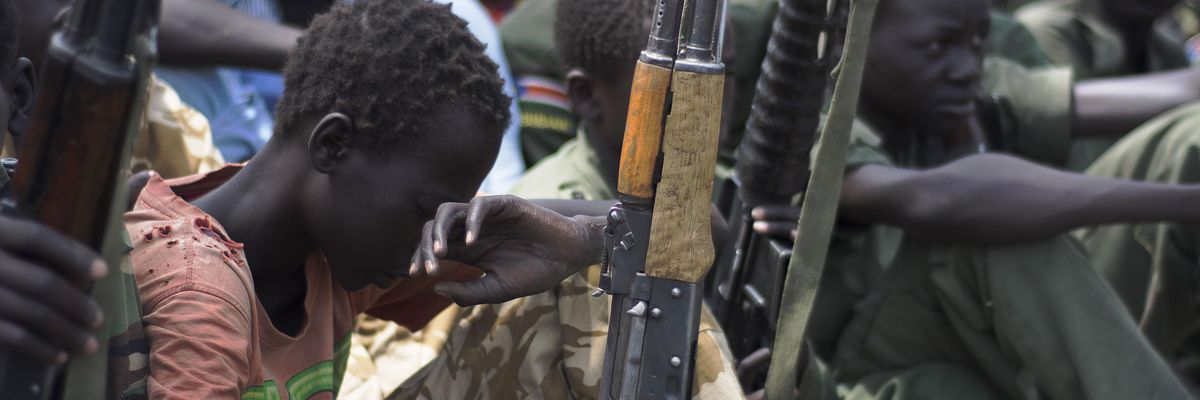For the third straight year, President Donald Trump has issued waivers to a law that prohibits US military assistance to nations whose armies or proxy militias include children among their ranks.
The White House recently announced the US was granting full or partial waivers to the Child Soldiers Prevention Act (CSPA) to Afghanistan, Democratic Republic of Congo (DRC), Iraq, Mali, Somalia, South Sudan and Yemen, seven of the 11 nations identified in the State Department's 2019 Trafficking In Persons Report (TIP) as being eligible for sanction under the law. CSPA, which was signed into law by President George W. Bush in 2008, prohibits US military aid and arms sales to countries whose armed forces recruit, conscript, employ or enslave children under the age of 18. The law contains a provision granting the president the authority to issue full or partial waivers if it is determined that doing so serves the US national interest, and if the country in question has taken steps to end the use of child soldiers.
The other four CSPA violators listed in the 2019 TIP are Burma (Myanmar), Iran, South Sudan and Syria. The State Department had also identified Saudi Arabia -- the world's leading buyer of US weapons -- as a violator due to its use of underage fighters in Yemen's civil war. However, Secretary of State Mike Pompeo blocked the inclusion of the kingdom on the CSPA violators list. The law lists eight types of military assistance, from weapons sales to training and education to peacekeeping operations. It is meant to leverage US aid by encouraging governments to stop using child soldiers, although Washington's frequent waivers have sent mixed signals about America's commitment to this laudable goal.
The Usual Suspects
The 2019 TIP detailed CSPA violations in the seven nations granted waivers by the Trump administration:
Afghanistan: According to the report, "Afghan security forces continued to unlawfully recruit and use child soldiers and exploit boys in bacha bazi," or "boy play," in which men buy and sell prepubescent children and teenagers who are exploited as sex slaves, servants and status symbols. The boys are forced to dress in women's clothing and to sing, dance, and sexually service their owners. Although bacha bazi is illegal under Afghan law, it endures --and is largely ignored by the US--due to the participation of powerful warlords who are America's allies in the war against the the Taliban, Al-Qaeda and Islamic State. The State Department has called bacha bazi "a widespread and culturally sanctioned form of male rape."
Democratic Republic of Congo: While this year's TIP commends the Congolese National Army (FARDC) for its significant efforts to end the use of child soldiers, it still lists the nation as a CSPA violator for, among other offenses, using proxy militias that recruited child soldiers and enslaved children for sex.
Iraq: The TIP states that Iraq's government "did not investigate or hold anyone criminally accountable for continued allegations of unlawful recruitment and use of child soldiers" by militias. The report also notes that there were "no reports of child soldiers used within the Iraqi military."
Mali: The report charges that Mali's government failed to take any action against child soldier traffickers. It also states that a Malian general commanded a militia that recruited and used child soldiers.
Somalia: The Somali National Army (SNA) and allied militias continue to recruit and use soldiers between the ages of 8 and 17, according to the TIP, although the government has taken steps to implement a 2012 action plan to eliminate the use of child soldiers. However, "efforts to do so remain incomplete," the report notes.
South Sudan: Despite taking some steps to address the issue of child soldiers, the TIP states that the South Sudanese government "continued to use and recruit child soldiers... at times by force," and did not fully implement its own action plan to demobilize children from security forces. Furthermore, the government did not hold any members of the South Sudan People's Defense Forces (SSPDF) criminally accountable for child soldier violations.
Yemen: The TIP notes that the Yemeni government has pledged to address the issue of child soldiers, although allied militias "continued to unlawfully recruit and use some child soldiers."
Exceptions Are the Rule
Last year, Trump issued CSPA waivers to Iraq, Mali, Niger, Nigeria, Somalia, South Sudan and Yemen. In 2017, he granted waivers to five nations. While the Trump administration was widely criticized for green-lighting US military support to child soldier violators, it was in fact continuing a practice that began during President Barack Obama's tenure. In 2010, Obama surprised many observers when he granted CSPA waivers to Chad, the DRC, Sudan and Yemen. Obama sent a memo to his secretary of state, Hillary Clinton, arguing that it was "in the national interest" in the war against terrorism to continue providing training and equipment to these countries' armed forces, despite their violations. Clinton signed off on the waivers without any public objection.
The following year Obama--who had assured critics in 2010 that the waivers were a one-off -- shocked human rights advocates around the world when he again exempted the same four countries from the CSPA. There was less surprise when he did so in 2012, and again every year during his second term. Other child soldier violators granted waivers by the Obama administration include South Sudan, Libya, Somalia, Rwanda, Central African Republic, Nigeria and Myanmar.
In 2017 Rep. Chris Smith (R-NJ), who was chairman of the House Panel on Africa, introduced a bill meant to foster more effective implementation of the CSPA by increasing congressional oversight and limiting presidential waivers. Smith said his bill would "ensure that the US is not complicit in partnering with child traffickers." The measure failed to advance.

